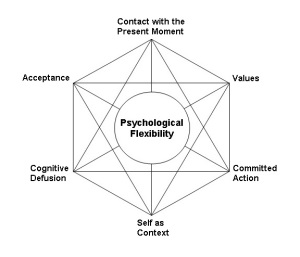What is Acceptance and Commitment Therapy?
ACT is an approach that guides people to accept what is outside of their control and commit to taking actions that enrich and improve their lives. ACT uses mindfulness and acceptance as well as other techniques for changing behavior. This therapeutic approach suggests that we cannot avoid suffering because we cannot control all of our experience and may not do well if we always seek to do so. ACT is rooted in behavioral and cognitive psychology.
A brief history of Acceptance and Commitment Therapy
ACT was developed in 1986 by Steve Hayes, as one of the first therapies of its type. It attempted to integrate mindfulness, cognitive, and behavioral strategies with a strong empirical base. ACT is unique because it can be used with a wide variety of situations, unlike other, more specialized approaches, and it is very flexible in its protocols, allowing the therapist to adapt it to the client’s specific needs. It teaches mindfulness through different paths to help the person apply these skills to many different areas of their life.
Does acceptance and commitment therapy work?
There is significant evidence to suggest that it Acceptance and Commitment Therapy is effective for a variety of mental health problems. ACT is at least as effective than other mainstream therapeutic interventions for anxiety and depression. It appears to have positive effects on anxiety, depression, obsessive-compulsive disorder, and chronic pain, among others.

Photo by Courtney Cook on Unsplash
Psychological flexibility is the ability to feel and think with openness, to attend voluntarily to your experience of the present moment, and to move your life in directions that are important to you, building habits that allow you to live life in accordance with your values and aspirations. It’s about learning not to turn away from what is painful, instead turning toward your suffering in order to live a life full of meaning and purpose.
-Steven Hayes, PhD

Photo by Richard Catabay on Unsplash
Is ACT Evidence-Based?
Acceptance and Commitment Therapy is considered evidence-based practice. It has been part of the SAMHSA National Registry of Evidence-based Programs and Practices since 2010. The evidence supporting its benefits has been growing quickly in the recent few years and is continuing to grow. ACT has a solid empirical basis and uses many techniques that have been shown to work effectively. It can increase psychological well-being, happiness, satisfaction, and many other things. Overall, it can increase outcomes by boosting psychological flexibility that is an important contributor to a person’s overall adaptation. Improving psychological flexibility is the key goal of this therapeutic approach.
Unlike other therapies, ACT does not adopt symptom reduction as a goal. Instead, Act assumes the view is that this approach can make things worse, especially in cases where the symptom is a part of who the person is or their daily experience. Rather, the goal is to learn to perceive that aspect that we cannot change as something uncomfortable but not really that harmful. Interestingly, this can lead to symptom reduction, although this is not the end goal.
How does Acceptance and Commitment Therapy work?
It uses six core processes that are acceptance, cognitive defusion, being present, the self as context, values, and committed action. This framework is known as the Hexaflex and is the basis of ACT. Let’s take a closer look at the elements of the Hexaflex.

Acceptance is the process of finding a way of acknowledging that the negative exists and suffering is necessary. It is, essentially, a way of recognizing that we have bad experiences that cause us suffering that we might not be able to change and ignore. Instead, we accept them and focus our efforts on changing other aspects of our life. Acceptance is a technique, not a goal.
Cognitive defusion is a set of techniques that tries to change how a person reacts to their thoughts and feelings. In ACT, the goal is not necessarily to avoid negative things but rather to react to them in a way that does not leave the person stuck or fixated.
Being present is the element this approach shares with mindfulness. It involves cultivating awareness of the present moment without judgment. The person learns how to engage with the experience they are having.
Self as context is the idea that an individual exists beyond their experiences, thoughts, and emotions. The individual is not just what is happening to them but there is a self that is experiencing that.
Values refer to the qualities a person chooses to work towards in any given situation. ACT tries to help the person to live a life that is consistent with their values.
Committed Action refers to the actions we take towards living the life we want to live.
The Hexaflex covers both the goals and the general techniques used in ACT. It is a therapy that tries to help the person accept and live with the things they cannot change and help them become more flexible, which can allow them to live better lives.
How does ACT work in practice?
Generally, ACT usually starts with a broad overview of the intervention and an introduction to acceptance. Acceptance is something that the person cannot control, whether it is a trait, an emotion, or a situation like pain. If the person focuses on changing something they cannot change, they are wasting their time and energy. They are bound to end up frustrated and without achieving what they wanted. Instead, it’s better to work with what is rather than what could be.
Acceptance involves allowing thoughts and emotions to happen without necessarily acting on them or allowing some things to continue as they are or taking responsibility for one’s own reaction even if the situation is beyond the person’s control.
ACT works to change the way in which a person views their own feelings and thoughts. People might feel anxious about having intrusive or obsessive thoughts or suddenly experience the impulse to do something. The therapy tries to help them understand what is happening and works with cognitive, behavioral, and mindfulness techniques to let these things happen and pass.
ACT is a unique and empirically sound approach with broad applicability. It can be especially useful for problems that are difficult to change or that involve recurring situations.A
Let's start the process towards healing and personal growth. Contact us today.
Not sure about therapy or counseling? We have brief measures to assess anxiety, depression, or trauma
Forman, Evan & Herbert, James & Moitra, Ethan & Yeomans, Peter & Geller, Pamela. (2007). A Randomized Controlled Effectiveness Trial of Acceptance and Commitment Therapy and Cognitive Therapy for Anxiety and Depression. Behavior modification. 31. 772-99. 10.1177/0145445507302202.
Ghouchani, S., Molavi, N., Massah, O., Sadeghi, M., Mousavi, S., & Noroozi, M. et al. (2018). Effectiveness of Acceptance and Commitment Therapy (ACT) on aggression of patients with psychosis due to methamphetamine use: A pilot study. Journal Of Substance Use, 23(4), 402-407. doi: 10.1080/14659891.2018.1436602
Heydari, M., Masafi, S., Jafari, M., Saadat, S., & Shahyad, S. (2018). Effectiveness of Acceptance and Commitment Therapy on Anxiety and Depression of Razi Psychiatric Center Staff. Open Access Macedonian Journal Of Medical Sciences, 6(2), 410-415. doi: 10.3889/oamjms.2018.064




